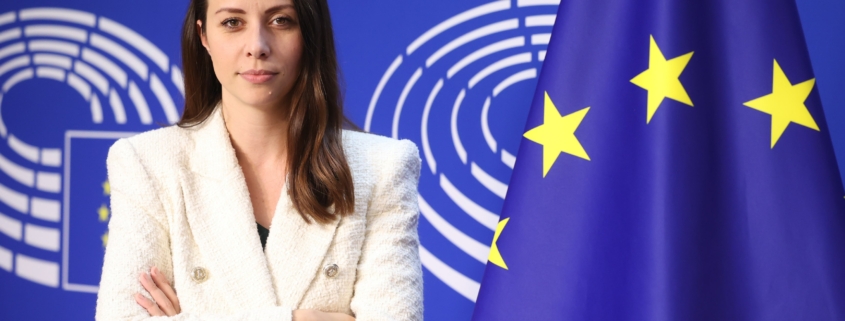On Friday, January 12, 2024, MEP Irena Joveva received a response from the Vice-President of the European Commission, Commissioner for Values and Transparency Vera Jourová, and the Commissioner for the Internal Market Thierry Breton, to her public letter calling for a revision of the European Directive on Audiovisual Media Services (AVMS Directive) by supplementing or extending the obligations for platforms offering (streaming) video content in Member States to translate subtitles or dubbing into all official languages of the European Union.
In a personal response to MEP Joveva, Vice-President Jourova and Commissioner Breton stressed that they share her goal of protecting linguistic diversity and are working towards this through a number of funding initiatives, such as the MEDIA programme under Creative Europe and a call for a study on the possibilities of exploring different European cultural content in the digital environment.
The key emphasis of MEP Joveva’s letter was that the aforementioned directive needs to be revised, which should also include provisions on respecting linguistic diversity, or extending the principle of non-discrimination to all audiovisual content, and that accessibility requirements for citizens through subtitling or dubbing should apply to all Europeans. Vice-President Jourova and Commissioner Breton stated that cultural and linguistic diversity remain the competence of the Member States, but at the same time assured that the European Commission would carefully examine Irene Joveva’s question and proposals as part of the evaluation process, and that they would also be “happy to involve her in the procedures”.
Upon receiving the letter, the MEP said:
“I am positively surprised that the two responsible Commissioners have taken such a thorough and individual approach to resolving the issue that I raised in my appeal. The European legislative process is indeed lengthy, but it is a very clear signal from the highest level of the EU executive, which could also mean that these companies are finally taking on the task of resolving this problem independently, i.e. before we make this an obligation at the level of the entire Union with the revision of the AVMSD. Slovenia has already taken a decisive step with the currently planned amendments to the Act on the Public Use of the Slovenian Language, but unfortunately this will not bring the desired solutions for video streaming content providers such as Netflix or Disney+, because due to the observance of the so-called country of origin principle, these companies in the EU fall directly and exclusively under the jurisdiction of the regulators in the countries where they are registered. The problem will be partially solved by adopting the recently agreed European Media Freedom Act, which will contain an article on the coordination of regulators of the Member States, which I sincerely hope will encourage the Slovenian regulator to make an appeal to regulators of other countries to respect linguistic diversity, i.e. to subtitling and synchronizing content into our native language, Slovenian. I have been trying for a long time to get these companies to do this independently, but due to their (too) slow responses, I am now trying to make these principles legally binding. I am convinced that the principle of non-discrimination on the basis of language should also be taken into account by private companies that offer their services in Slovenia and other EU member states. At a time when the Internet represents an increasingly large part of our lives, we must strive for equality for all European languages. This is a right that is imposed, among other things, by the fundamental treaties of the EU. I argue that subtitling and synchronizing content in the Slovenian language is necessary to prevent such discrimination, but at the same time I point out that languages on the Internet are also unequal in other areas, for example in the moderation of content and other provisions of the recently adopted legislation, the Digital Services Act. The aspect of language equality is also often overlooked in EU legislation and it is time to correct these injustices.”
We are also attaching the original letter in English and Slovenian for your reading.




Leave a Reply
Want to join the discussion?Feel free to contribute!